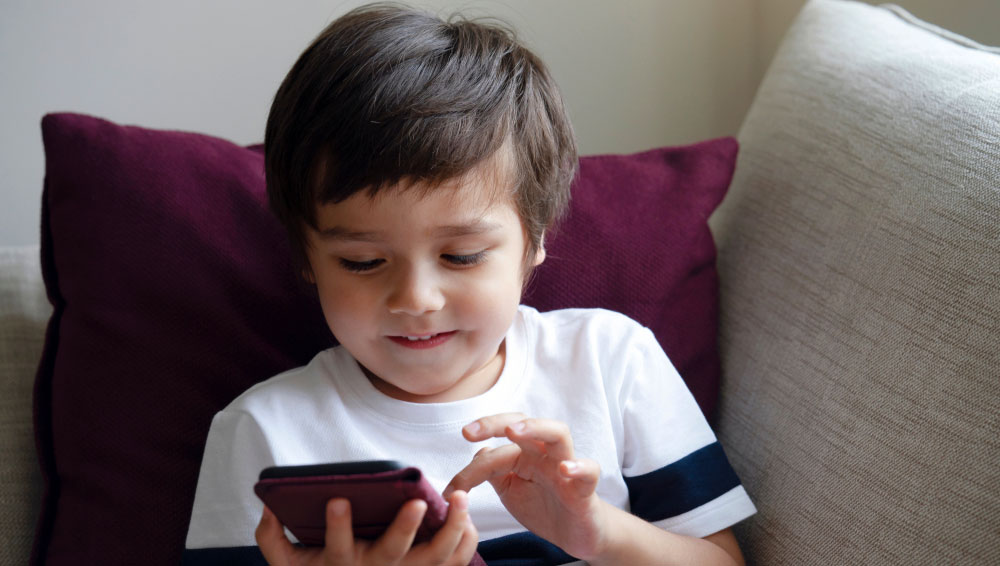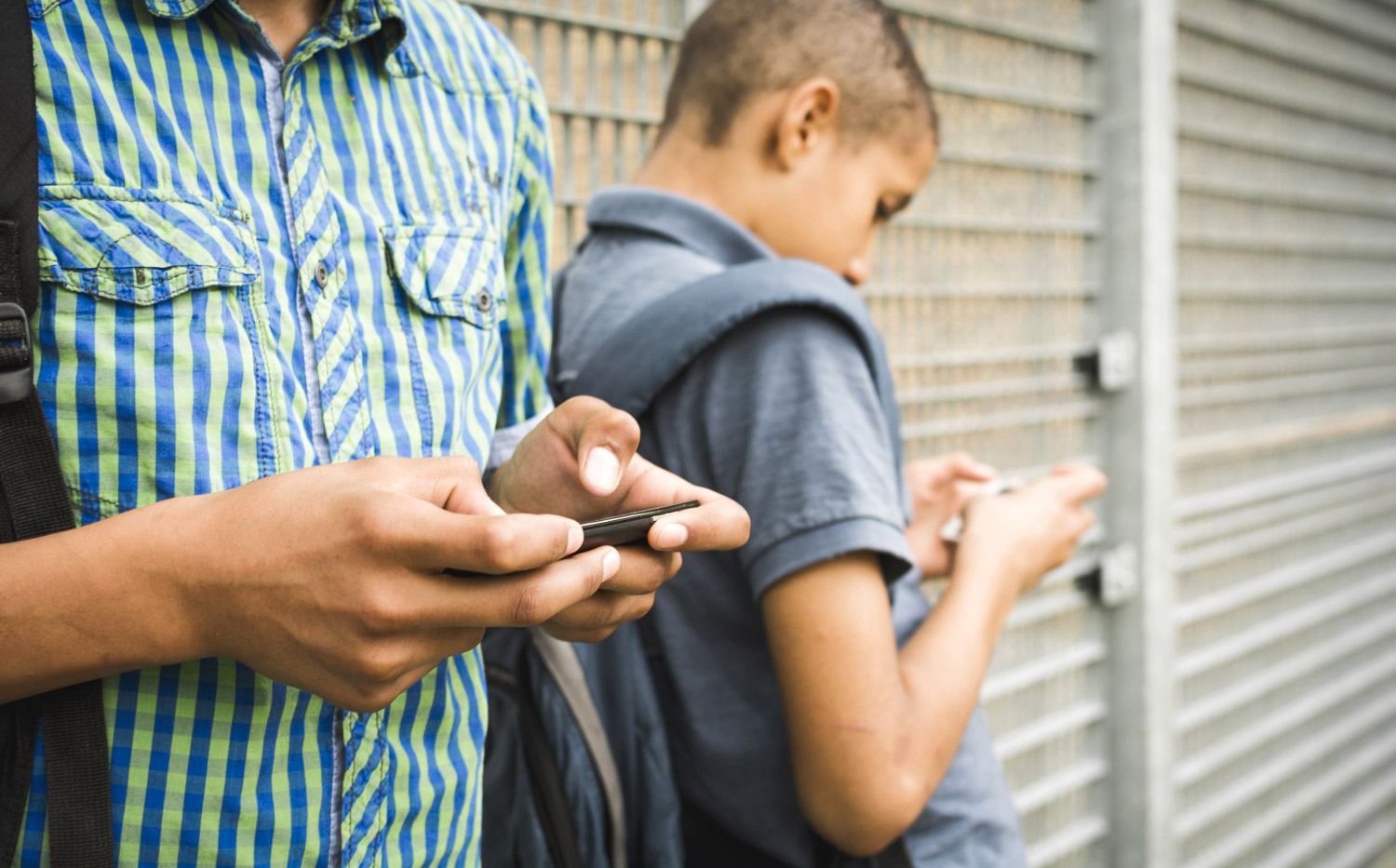
Getting a smartphone for your child this back-to-school season? You’ve probably got a lot of questions when it comes to buying a phone for your child. Let’s be honest, if your child doesn’t have a smartphone yet, one of the questions you have is, “when is my child old enough to have a smartphone?”
In this back-to-school cell phone shopping guide, we’ll share things to consider when you’re buying a phone for your kid—like parental controls, screen time, cost, school policies, discussions to have, and more.
Here are questions to ask yourself before back-to-school cell phone shopping for your kids.
At what age should you get your kid a phone?
Believe it or not, the experts we interviewed said your child’s age shouldn’t be the deciding factor when it comes to buying a phone.
“Realistically, kids are getting their phones somewhere between eight and 12-years-old,” says Catherine Pearlman, PhD, LCSW, author of First Phone: A Child’s Guide to Digital Responsibility, Safety and Etiquette (Penguin Random House, 2022). "There’s a movement to wait until eighth grade, about 13 years old. By the time kids are 13, they already have tablets and computers, and they can essentially do everything that a phone can do — like sign up for social media.”
“Parents say to me, ‘My kid doesn't have a phone, so I don't have to worry about a lot of [smartphone] issues, and I watch over them on their tablets,’” says Pearlman. “But, in speaking to kids in elementary school, even fourth and fifth graders have a vast experience in the digital world, including social media, and being online with strangers in games like Roblox and Minecraft, or even being cyberbullied by friends from school. They've experienced a lot long before parents realize what's going on.”
Before you buy a smartphone for your child, think about what they need it for. Is it to track their diabetes medication? Do they need to call someone to get picked up from school or stay in touch with divorced parents? Do they walk home from school by themselves? Is it simply because “everyone else in their grade has one?”
As you’re weighing the decision about whether to get your child a smartphone — or give them your old one — ask yourself, “What is giving your child a phone going to add to your family life?” Jill Murphy, editor in chief and head of distribution at Common Sense Media said, “parents often think, ‘it's about my connection to my kids.’ But you're not thinking about who and what they're connecting to when they're not communicating with you."
You can limit apps and usage when they are younger and expand that access as they get a little older based on the maturity level, suggests Murphy.
Is your kid ready for a smartphone?

Ask yourself these questions and be prepared to have quite a few discussions with your child about their phone before you buy a back-to-school smartphone — and after they have one!
- Are they mature? Do they respond well to your family rules? Are they doing well in school? Are they are rule follower? You know your kid and that’s an important factor that should go into the decision for them to have a cell phone.
- Think about how they handle screentime boundaries now: Do they freak out when you tell them to turn the tablet or computer off and to stop playing video games?
- Are they responsible? If you’re thinking of buying your child a smartphone for back-to-school and you know they’re the type of kid who loses their umbrella each month, they might not be mature enough to handle the responsibility of this expensive tech.
- Do you trust them? Establish that trust in conversations from day one, setting expectations and boundaries verbally. It can also be helpful to create a printed cell phone contract that they can see and everyone signs before you hand over a phone.
Discussions you should have before buying your child a smartphone
Here are some topics to bring up before letting your child have a phone. It's important to have them to set up those aforementioned boundaries and expectations.
- Who owns the phone? Let them know you own the phone and you will be spot checking their phone periodically if that’s what your family agrees to. “That’s not to punish them but to advise them and make sure that they're safe,” says Pearlman.
- What they are using it for? Think about if it’s for logistical safety reasons, social/texting, contacting parents, games, fun, and leisure activities.
- Where will the phones be stored and charged: Pearlman suggests putting chargers in a common area and creating a rule that kids can’t have their phones in their bedrooms at night when sleeping.
- What are your family values? This could come down to times when it’s appropriate for your family to be on their phones and times when they should be put away.
- What information do we never give out? Make sure your child knows to never share their full name, birthday, home address, school or any identifying details online.
- How to handle challenging situations: Bring up predators, cyber bullying, being contacted by someone they don’t want to have their number, someone sharing an illicit photo, and seeing troubling videos or images online with your child.
- What their responsibility is: Address if they will pay for part of the phone or the phone plan, as well as what happens if/when it breaks or is lost.
- Can you afford it? What type of smartphone works for your family’s budget? How will their smartphone impact your monthly bills?
- How much time are they allowed on their phones? How much screen time will you allow? Know you’ll need to enforce these rules. “It’s not about your child’s willpower,” says Pearlman. “These things are made to be addictive, to be hold her interest and keep her interest and when we put it down. You’ll need to manage your child’s phone usage.”
Should you use parental controls?

In a word, our experts said, “Yes.”
“The best parental control is the parent so stay in touch with what your kids are doing,” suggests Murphy.
Try the parental controls that come with an Android or iOS phone out of the box before spending money on additional parental control software. Most providers have parental control features as well so look into options available through Verizon Wireless, T-Mobile, Sprint, Google Fi, AT&T, Boost, and so on.
Most parental controls help you set screen time limits, set up purchase limits on what your child can spend, block contacts, monitor web activity, and pause internet access. Yes, if you want your kids offline, you can simply cut the Wi-Fi at home, too.
The best parental control is the parent so stay in touch with what your kids are doing
Jill Murphy
Some parental control apps monitor kids’ text messaging through your cell phone provider, like text mirroring, or you can download parental control apps.
“Kids always find a way to get whatever it is that they're wanting to get or they find a loophole,” says Pearlman. “That's just the nature of kids being kids.”
But keep in mind three lessons as you think about parent controls and parental control software:
- Parental controls are not set-it-and-forget it guardrails. You should still exercise due diligence when it comes to monitoring a child’s phone usage.
- Your kid — or their friends — will eventually know how to get around it. Someone will show your kid how to get around parental controls. There are TikTok channels dedicated to it. Welp.
- Someone else’s kid won’t have parental controls. Even though you might have strict parental controls on your child’s phone, chances are, they will still be able to access something on the internet through another kid’s phone. (And yes, even set up their own social media profiles on someone else’s phone.)
Decide what level of privacy your child will have

It’s important for parents to check their younger child’s phone often and do it in an open-minded, calm way. “It’s even more important to remain calm if/when you see something that concerns you and ask open ended questions and be supportive,” suggests Pearlman. “Don’t just lecture and punish and take away the phone when they see something.”
She believes parents shouldn’t be checking the phones of their 16-year-olds and older teens. “I wouldn't have wanted my parents in my conversations on the phone with my friends…without my knowledge, and I think that teens should have some aspect of privacy,” she says.
You won’t even know what apps your kids are using, because they're not even on their phone, they hide them, Pearlman says.
It’s not just about what’s on their phones, it’s about what’s not on their phones, says Murphy. “Go into the app store and put in Snapchat or put in TikTok and see if that little arrow is there where they can redownload it so then you have an indicator that they've been downloading it and deleting it.”
School policies for kids’ smartphone usage
Check with your child’s school about their policies on cell phones in general. It will likely be in a student handbook. Many schools prohibit use of cell phones upon entering the school and they have to be turned off and put away.
Final considerations before buying a back-to-school smartphone for your child

Now that you’re probably feeling particularly cautious about buying your child a smartphone, know that you still need to have these conversations around technology use with your child even if you don’t buy them a smartphone for back to school.
Teach them responsibility with all technology and how to identify red flags for scammers, predators, fishing, and cyber bullying. “Educate and inform them so they can make good decisions [on any platform],” says Pearlman.
“Establishing ground rules with a phone is important, but establishing an open line of communication is even more important because inevitably, they are going to come up against content that is unexpected,” says Murphy. “Whether it's on YouTube, a social platform, from their own friends, or getting a video sent that they really didn't need to see. It's always better for them to feel like they can come to their parents to deal with that without the threat of their phone being taken away,” Murphy suggests.
And finally, set a good example. Make sure you’re talking to them about what you’re doing when you’re on your phone, minding the cell phone usage rules, and letting them know they can come to you with anything they see that concerns them.







